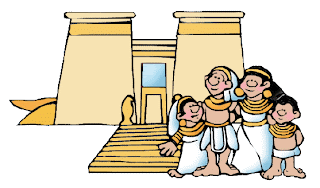 The nuclear family was the fundamental social unit of ancient Egypt. “The family was broken down into roles that each would play in order for things to run smoothly. The father was the one who would work all day. In smaller households the mother was in charge of all things pertaining to the house. Cooking, cleaning and watching the children were all her responsibilities. In some larger homes servants served as maids and midwives to help the mother.”[1]
The nuclear family was the fundamental social unit of ancient Egypt. “The family was broken down into roles that each would play in order for things to run smoothly. The father was the one who would work all day. In smaller households the mother was in charge of all things pertaining to the house. Cooking, cleaning and watching the children were all her responsibilities. In some larger homes servants served as maids and midwives to help the mother.”[1]Firstly Ancient Egypt culture makes and establishes many rules and policies to get an organized civilization in order to divide efficiency and evenly work depending of the gender of the society , because that will define what activities they can do or that will give the importance of their work to the community and which responsibilities they have to obtain .
Secondly, inside the family the women were responsible for the day-to-day operations and decisions. Women did and needed to have the same legal rights and status under the law as men who were gone from the home much of the time due to seasonal projects or warfare. The division of labor within a household evolved from environmental conditions.
For example, peasant children accompanied their parents into the fields; the male offspring of craftsmen often served as apprentices to their fathers. Many privileged children received formal education to become a scribe. Some promising youngsters were taught by priests in temples, and children of the nobility sometimes received private instruction from tutors or learned to be an officer in the army.
As a result, an ordinary family cooking was done by the housewife, but larger households employed servants to work in the kitchen and a chef who usually do the cooking (important and usual dinner). For this reason the Egyptians had ovens, and knew how to boil roast, and fry food.
As a consequence of that, the father was responsible for the economic well-being of the family. Upper-class men often became scribes or priests, while lower-class men often were farmers, hunters, potters, or other craftsmen. The mother supervised the household, including servants, and cared for the upbringing of the children. Upper-class women could become priestesses, and all women could become musicians or professional mourners.
Children stayed at home until they reached marriageable age (about twenty for males, younger for females). Although Egyptian children had toys and are occasionally depicted at play, much of their time was spent preparing for adulthood.
To sum up the roles in the Ancient Egypt family the men did very physical labor in the hot sun, and women labored inside or in the shade. Women attended to the household's gardens and orchards. There were no formal schools for girls, so mothers educated their daughters in the home. Women did attend professional schools, such as the school of medicine at Heliopolis and the woman's school at Sais, to learn to become doctors.






No comments:
Post a Comment